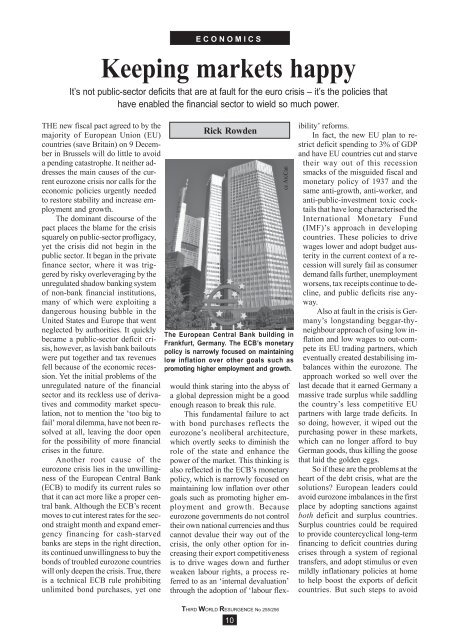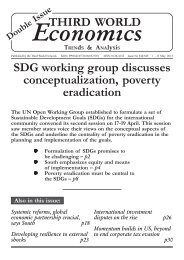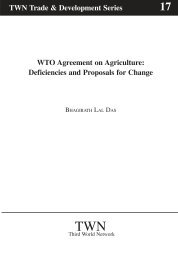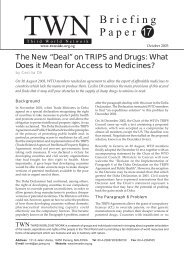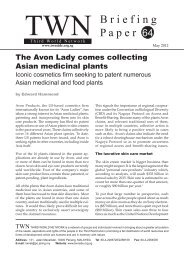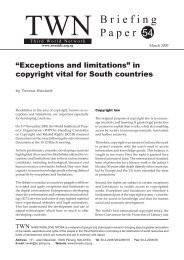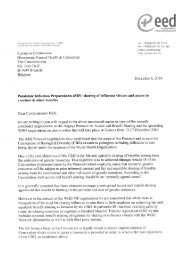Download - Third World Network
Download - Third World Network
Download - Third World Network
Create successful ePaper yourself
Turn your PDF publications into a flip-book with our unique Google optimized e-Paper software.
Keeping markets happy<br />
It’s not public-sector deficits that are at fault for the euro crisis – it’s the policies that<br />
have enabled the financial sector to wield so much power.<br />
THE new fiscal pact agreed to by the<br />
majority of European Union (EU)<br />
countries (save Britain) on 9 December<br />
in Brussels will do little to avoid<br />
a pending catastrophe. It neither addresses<br />
the main causes of the current<br />
eurozone crisis nor calls for the<br />
economic policies urgently needed<br />
to restore stability and increase employment<br />
and growth.<br />
The dominant discourse of the<br />
pact places the blame for the crisis<br />
squarely on public-sector profligacy,<br />
yet the crisis did not begin in the<br />
public sector. It began in the private<br />
finance sector, where it was triggered<br />
by risky overleveraging by the<br />
unregulated shadow banking system<br />
of non-bank financial institutions,<br />
many of which were exploiting a<br />
dangerous housing bubble in the<br />
United States and Europe that went<br />
neglected by authorities. It quickly<br />
became a public-sector deficit crisis,<br />
however, as lavish bank bailouts<br />
were put together and tax revenues<br />
fell because of the economic recession.<br />
Yet the initial problems of the<br />
unregulated nature of the financial<br />
sector and its reckless use of derivatives<br />
and commodity market speculation,<br />
not to mention the ‘too big to<br />
fail’ moral dilemma, have not been resolved<br />
at all, leaving the door open<br />
for the possibility of more financial<br />
crises in the future.<br />
Another root cause of the<br />
eurozone crisis lies in the unwillingness<br />
of the European Central Bank<br />
(ECB) to modify its current rules so<br />
that it can act more like a proper central<br />
bank. Although the ECB’s recent<br />
moves to cut interest rates for the second<br />
straight month and expand emergency<br />
financing for cash-starved<br />
banks are steps in the right direction,<br />
its continued unwillingness to buy the<br />
bonds of troubled eurozone countries<br />
will only deepen the crisis. True, there<br />
is a technical ECB rule prohibiting<br />
unlimited bond purchases, yet one<br />
E C O N O M I C S<br />
Rick Rowden<br />
cc ArcCan<br />
The European Central Bank building in<br />
Frankfurt, Germany. The ECB’s monetary<br />
policy is narrowly focused on maintaining<br />
low inflation over other goals such as<br />
promoting higher employment and growth.<br />
would think staring into the abyss of<br />
a global depression might be a good<br />
enough reason to break this rule.<br />
This fundamental failure to act<br />
with bond purchases reflects the<br />
eurozone’s neoliberal architecture,<br />
which overtly seeks to diminish the<br />
role of the state and enhance the<br />
power of the market. This thinking is<br />
also reflected in the ECB’s monetary<br />
policy, which is narrowly focused on<br />
maintaining low inflation over other<br />
goals such as promoting higher employment<br />
and growth. Because<br />
eurozone governments do not control<br />
their own national currencies and thus<br />
cannot devalue their way out of the<br />
crisis, the only other option for increasing<br />
their export competitiveness<br />
is to drive wages down and further<br />
weaken labour rights, a process referred<br />
to as an ‘internal devaluation’<br />
through the adoption of ‘labour flexibility’<br />
reforms.<br />
In fact, the new EU plan to restrict<br />
deficit spending to 3% of GDP<br />
and have EU countries cut and starve<br />
their way out of this recession<br />
smacks of the misguided fiscal and<br />
monetary policy of 1937 and the<br />
same anti-growth, anti-worker, and<br />
anti-public-investment toxic cocktails<br />
that have long characterised the<br />
International Monetary Fund<br />
(IMF)’s approach in developing<br />
countries. These policies to drive<br />
wages lower and adopt budget austerity<br />
in the current context of a recession<br />
will surely fail as consumer<br />
demand falls further, unemployment<br />
worsens, tax receipts continue to decline,<br />
and public deficits rise anyway.<br />
Also at fault in the crisis is Germany’s<br />
longstanding beggar-thyneighbour<br />
approach of using low inflation<br />
and low wages to out-compete<br />
its EU trading partners, which<br />
eventually created destabilising imbalances<br />
within the eurozone. The<br />
approach worked so well over the<br />
last decade that it earned Germany a<br />
massive trade surplus while saddling<br />
the country’s less competitive EU<br />
partners with large trade deficits. In<br />
so doing, however, it wiped out the<br />
purchasing power in these markets,<br />
which can no longer afford to buy<br />
German goods, thus killing the goose<br />
that laid the golden eggs.<br />
So if these are the problems at the<br />
heart of the debt crisis, what are the<br />
solutions? European leaders could<br />
avoid eurozone imbalances in the first<br />
place by adopting sanctions against<br />
both deficit and surplus countries.<br />
Surplus countries could be required<br />
to provide countercyclical long-term<br />
financing to deficit countries during<br />
crises through a system of regional<br />
transfers, and adopt stimulus or even<br />
mildly inflationary policies at home<br />
to help boost the exports of deficit<br />
countries. But such steps to avoid<br />
THIRD WORLD RESURGENCE No 255/256<br />
10


